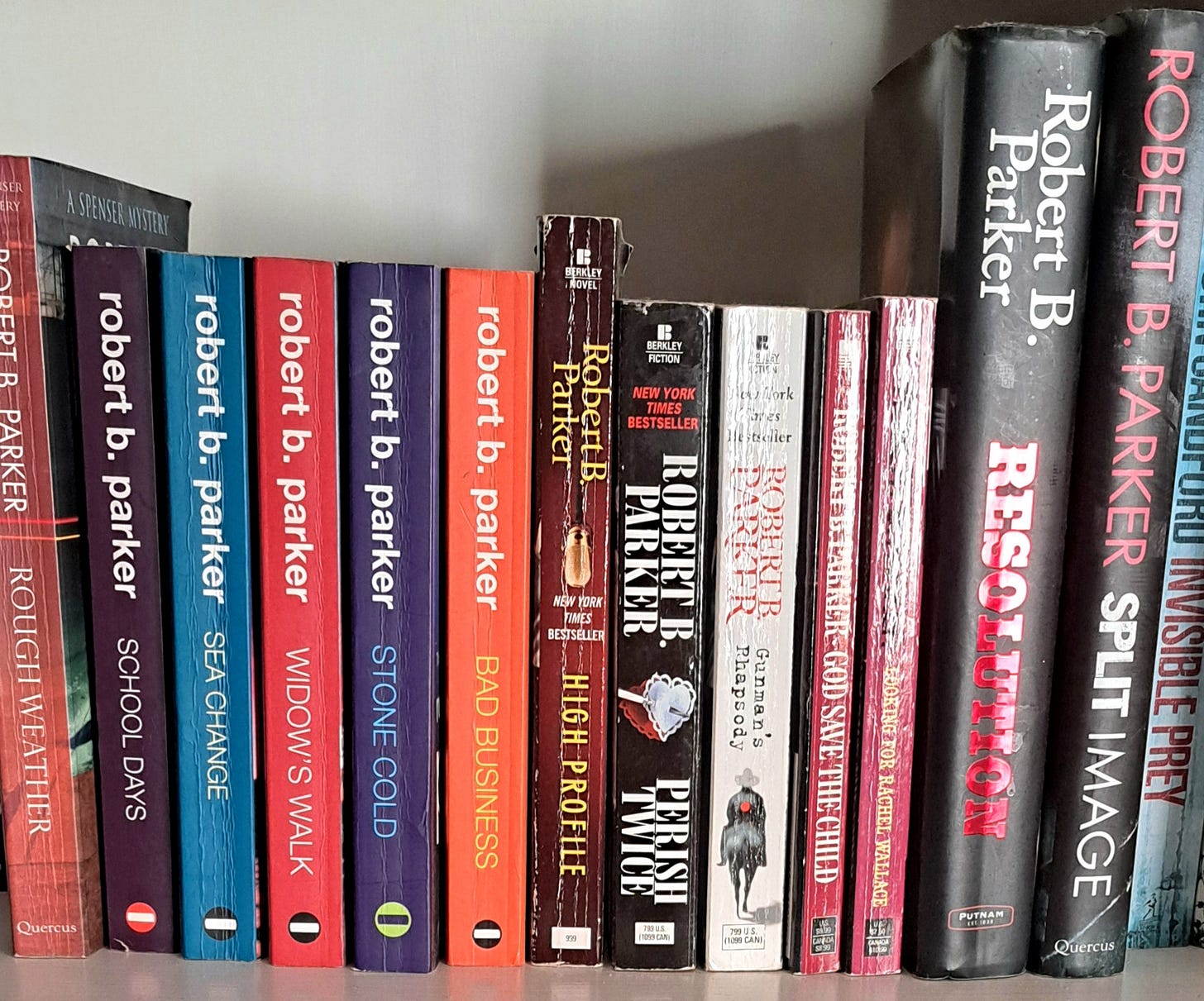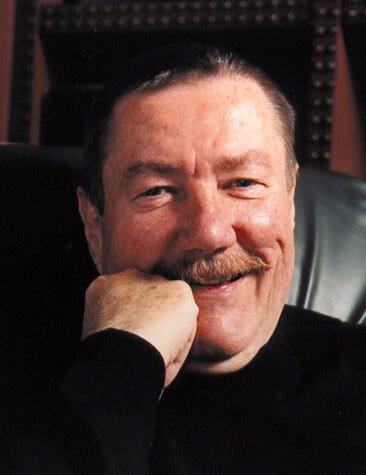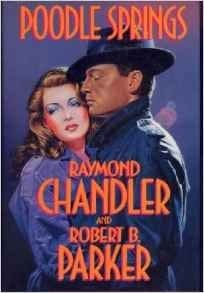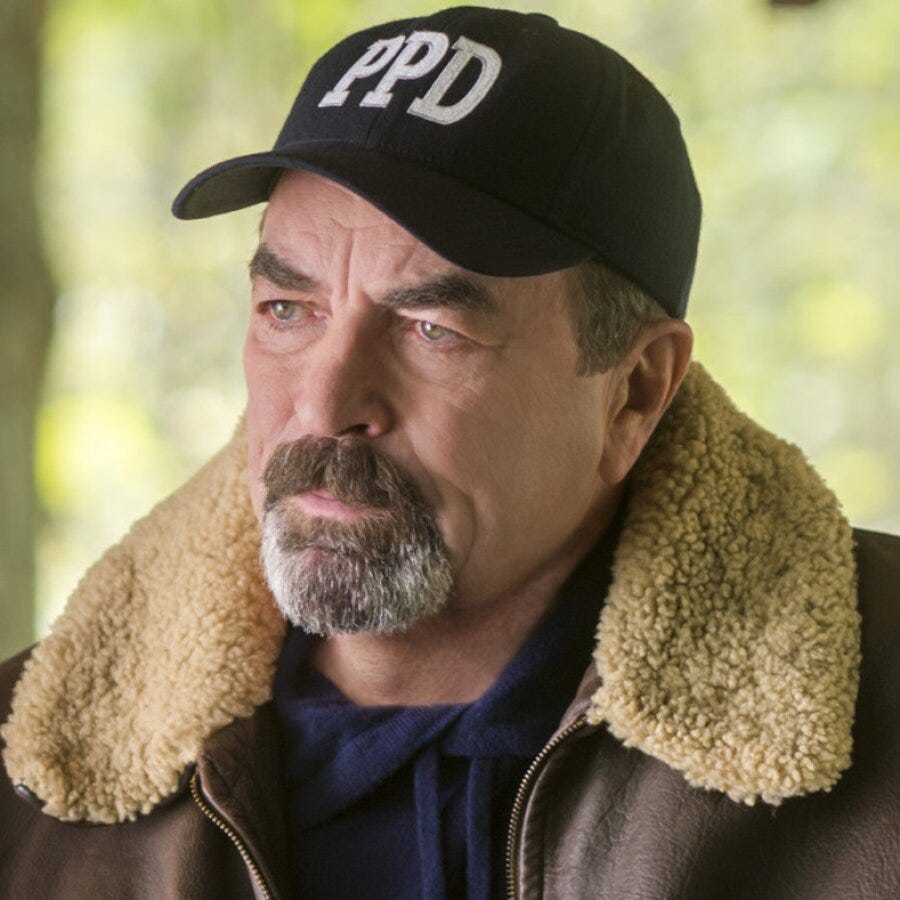Tough egg, with a soft centre...
.... will America's modern-era Raymond Chandler ever make it big in Britain?

For a couple of decades or more, my favourite crime writer has been an American college professor whose name and books are little known over here in the UK. I’ve loved his laconic, dialogue-led writing since I picked up the first of his books, which I found while searching a US airport bookstand for inspiration.
Before Kindle, books were a liability on a long overseas trip. Half a dozen volumes made a big dent in my luggage allowance. So my habit when visiting the US for work was to buy on the hoof and discard once read, hoping they would be picked up by some later user of whatever hotel room I was in. It found me several new favourite authors, but none has lasted as long, nor entertained me so reliably, as Robert B Parker. And his books became the exception - I always took them home when I had read them.
I’ve never understood why Parker didn’t catch on in the UK. It’s not that publishers haven’t tried. The UK rights to some of his titles were acquired by No Exit Press, the independent imprint founded 30 years since by Ion Mills. I know NEP produced at least five of Parker’s novels because I’ve got them on my shelves. It seems there was an exit for Mills, as his company has since been absorbed by a larger publisher, although that still hasn’t brought Parker into mainstream UK crime sales.
Perhaps that is about to change. Parker has recently popped up in the cool and bookish pages of Slightly Foxed, a quarterly collection of literary essays beloved by my wife Sarah. The other day I picked up a recent edition she had been reading and found Parker has been championed in an article by journalist Sam Leith, who knows a thing or two about crisp copy, as he’s a grandson of the 60s Fleet Street columnist and editor, John Junor. In the Winter edition of Slightly Foxed, Sam explains how he first came across Parker’s books in Newark, New Jersey in 2002 while mooching round the airport looking for something to read on the plane in case he couldn’t sleep during the flight - circumstances spookily similar to my own.
“I read it with no expectations but finished the whole book before my flight landed. I loved it. It was funny and gripping and sarcastic and although unshowily well written, it had no pretensions to being great literature. It was the perfect pulp.” writes Sam.
Maybe some exposure in Slightly Foxed will be the trigger for a fresh interest in Parker on these shores. But just in case it doesn’t, let me try and tempt you to take an interest.
Parker himself was never a cop or a private eye, or connected with the law. The style, content and asides of Parker’s books derive from his obsession with the hard-boiled heroes of Raymond Chandler and Dashiell Hammett, whose books provided the inspiration for his PhD research.
Having secured his doctorate Parker spent the rest of his professional life as a English professor in New England. Parker’s alter ego and hero of many of his 60 novels is a Boston private eye called Spenser. I don’t know his other name - I’ve never found it in any of the novels. But how very Parker it was to name his main character after a 16th century English poet, for literary allusions are scattered throughout his books. Indeed one of the joys of reading them is to spot references and quotations which echo Shakespeare, Spenser or perhaps Marlowe.
The chief pleasure though is Parker’s own writing. It’s spare and pacy and based substantially on dialogue. Just my sort of thing.
Most of the 60 Parker works of fiction are Spenser novels. I’m sorry to say that his Estate continued the theme after his untimely death in 2010 at the age of 77. I suppose the Golden-egg laying Goose was just too hard to kill. The publishers handed the franchise to another well-known crime novelist and one I really admire - Ace Atkins. To date he has turned out maybe 10 Spenser novels. I’ve read a couple - didn’t get along with them.
I don’t know if it’s a good or bad idea to hand established characters over to a different writer. I am not sure it’s working for Lee Child, for instance, now his younger brother has taken over the family business. The Boston Globe didn’t like the idea of a new author slipping in to Parker’s trademark leather Blouson and baseball cap, but guessed that Parker would not have been too bothered. The Globe acknowledges that some might have viewed the move as unseemly, but went on…“those people didn't know Robert B. Parker, a man who, when asked how his books would be viewed in 50 years, replied: 'Don't know, don't care.' He was proud of his work, but he mainly saw writing as a means of providing a comfortable life for his family."
Parker himself wasn’t above picking up where other writers left off. Raymond Chandler died with four chapters of a new book written. Parker accepted the job of finishing the novel - and nobody really knew Chandler’s style or methods better than Parker did from his PhD researches. We have the two of them to thank for Poodle Springs. I hadn’t read the book until writing this but today, on a car journey, I listened to a 58 minute BBC dramatisation I found on Audible. Good listening!
Parker produced other novel series based around different characters. Some don’t hit the mark for me, but I do enjoy the Jesse Stone series. Here the hero is a washed-up LA cop who moves across the States and ends up in paradise as Chief of Police. This Paradise (maybe another echo of John Milton) is a tiny seaside town on Massachusetts Bay, with just five cops on the payroll. It’s a longish drive from Boston but close enough for story-lines to feature Parker’s beloved city from time to time.
You may have seen some of the TV adaptations - Tom Selleck played Stone and damned well, I think. Parker was still alive when the TV movies began and I think that’s why the adaptations are so accurate. In the Spenser novels the writing is in the first person. Spenser is Parker, after all. But with Stone he has to adopt a different, third-person technique, but masters it well.
For that’s what Parker was. A master of his craft. Other crime writers often name him as an influence. Bestselling crime writer, Harlan Coben, is quoted as saying: “When it comes to detective novels, 90 percent of us admit Parker’s an influence, and the rest of us lie about it.”
Slightly Foxed can be found here, if you want to know more about this cute little Quarterly:- https://foxedquarterly.com
If I have persuaded you to try Parker, here is a list of the Spenser novels - definitely his best work, in my view, as you’ve probably gathered. Enthusiasts say that you don’t need to start at the beginning and work through chronologically. That’s true, up to a point, but there is quite a bit of character development and I would advise starting early and going forward, even if you don’t find every title.
The Godwulf Manuscript (1973)
God Save the Child (1974)
Mortal Stakes (1975)
Promised Land (1976)
The Judas Goat (1978)
Looking for Rachel Wallace (1980)
Early Autumn (1981)
A Savage Place (1981)
Ceremony (1982)
The Widening Gyre (1983)
Valediction (1984)
A Catskill Eagle (1985)
Taming a Sea-Horse (1986)
Pale Kings and Princes (1987)
Crimson Joy (1988)
Playmates (1989)
Stardust (1990)
Pastime (1991)
Double Deuce (1992)
Paper Doll (1993)
Walking Shadow (1994)
Thin Air (1995)
Chance (1996)
Small Vices (1997)
Sudden Mischief (1998)
Hush Money (1999)
Hugger Mugger (2000)
Potshot (2001)
Widow's Walk (2002)
Back Story (2003)
Bad Business (2004)
Cold Service (2005)
School Days (2005)
Hundred-Dollar Baby / Dream Girl (2006)
Now and Then (2007)
Rough Weather (2008)
The Professional (2009)
Painted Ladies (2010)
Sixkill (2011)
Silent Night (2011)







Very persuasive. I will investigate! Thanks for the recommendation 😀
Nice appreciation! When I was in college, I wrote Parker a letter, asking him to name his favorite detective novel. He wrote me back, telling me it was, unsurprisingly, The Big Sleep.